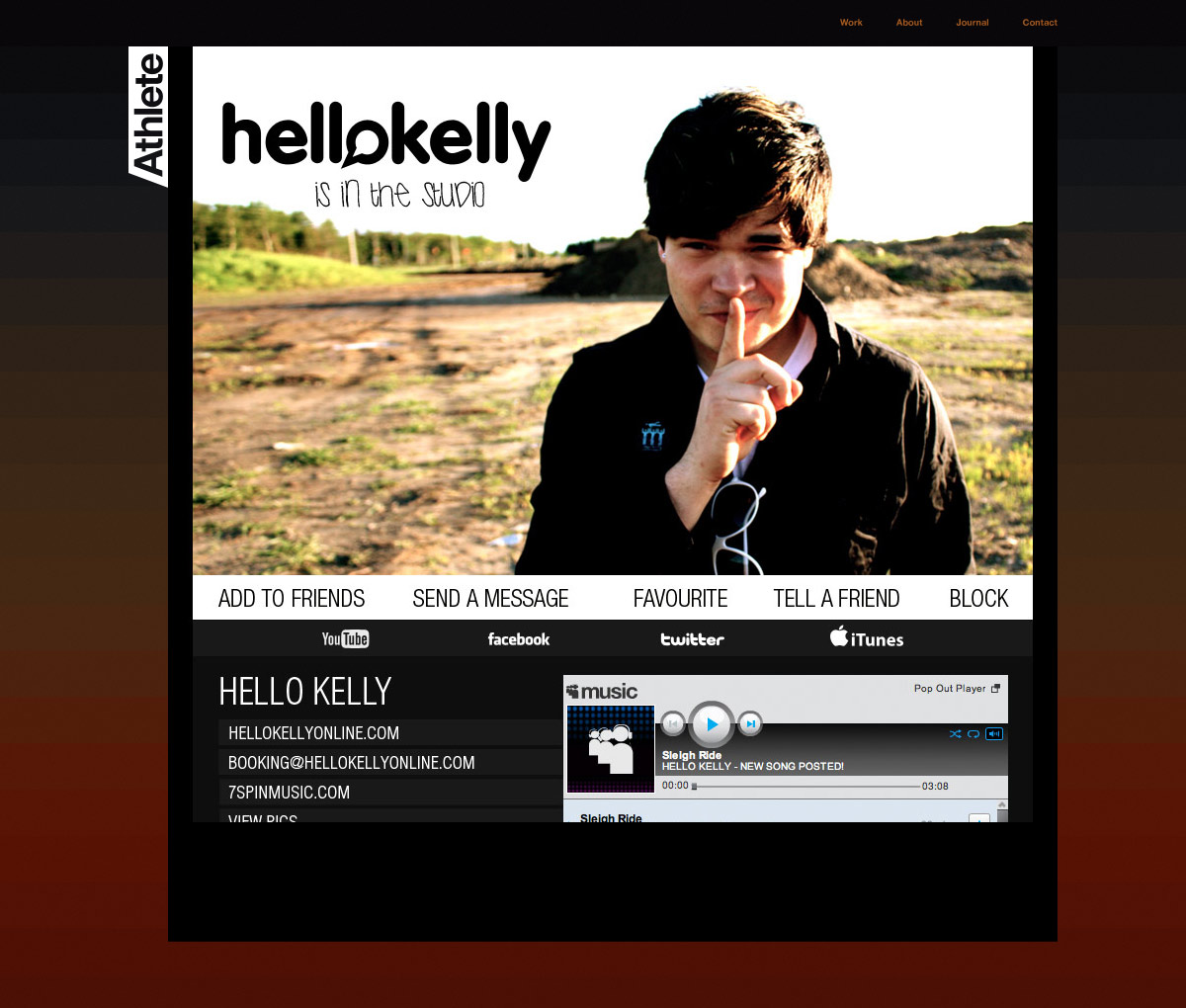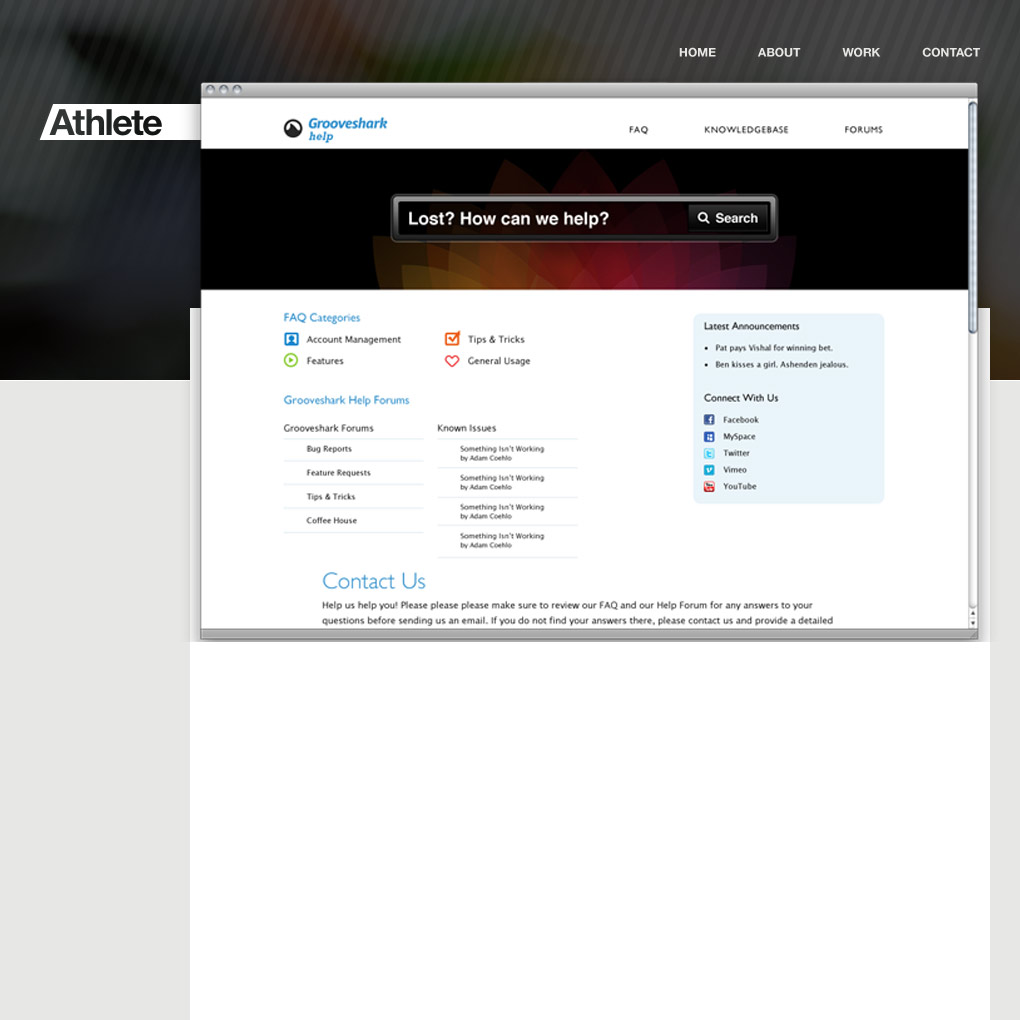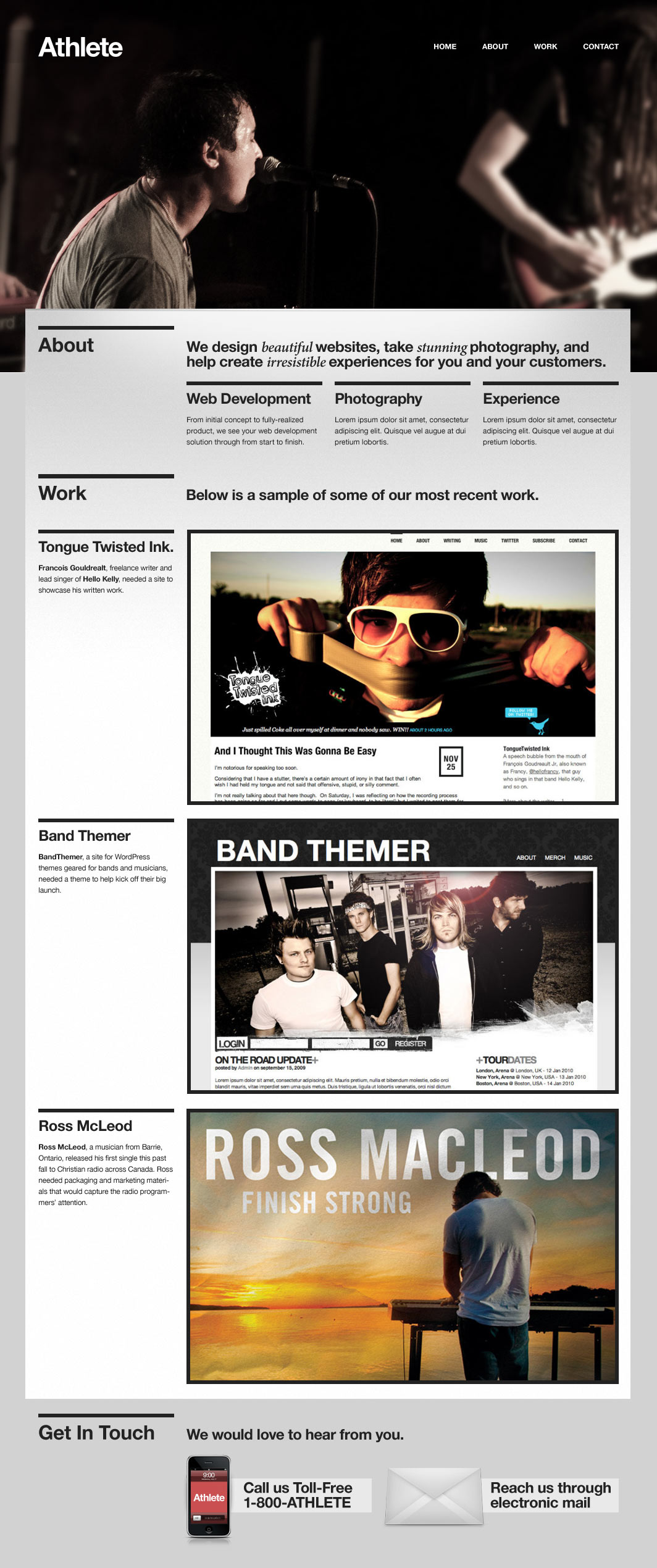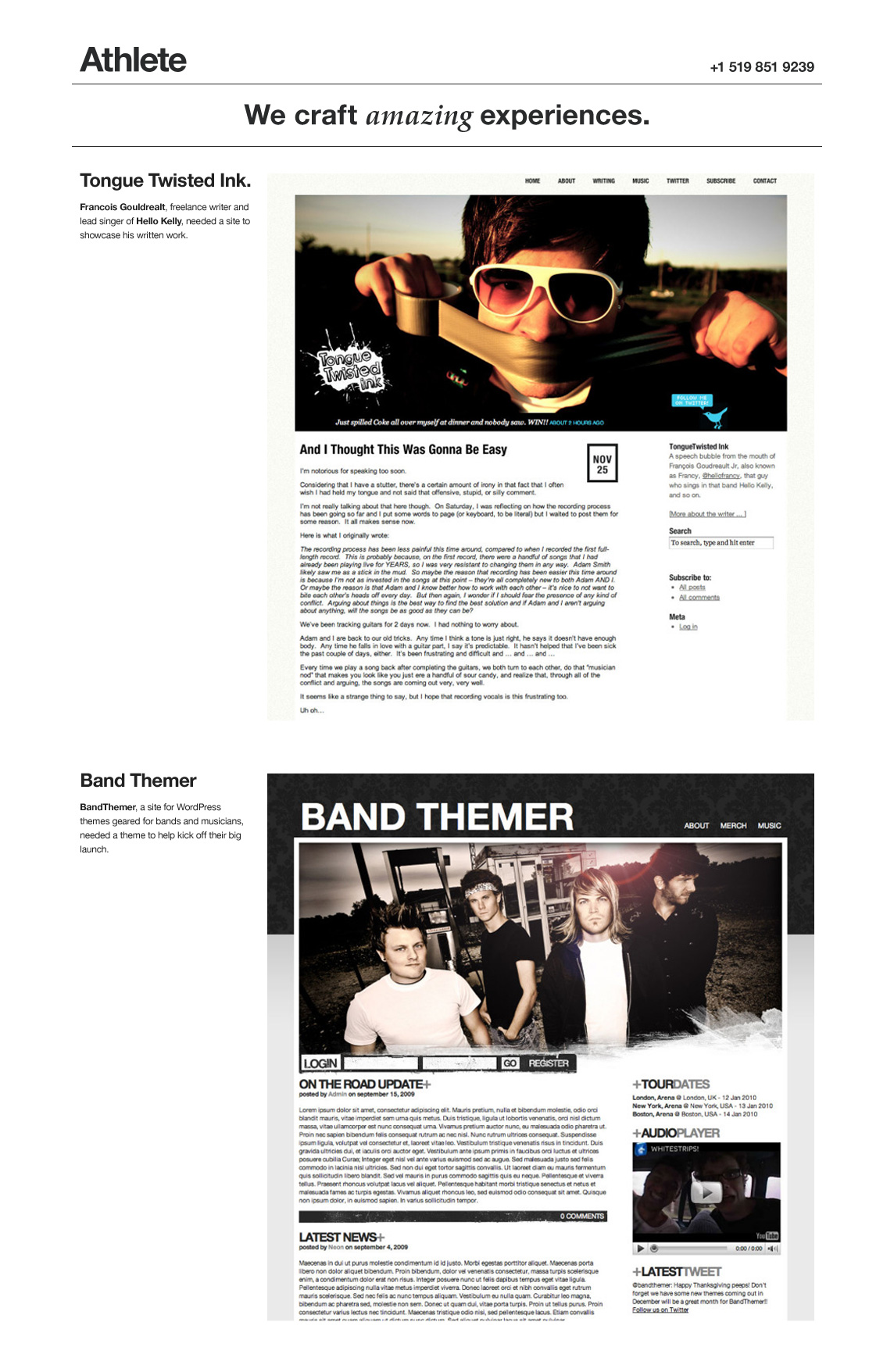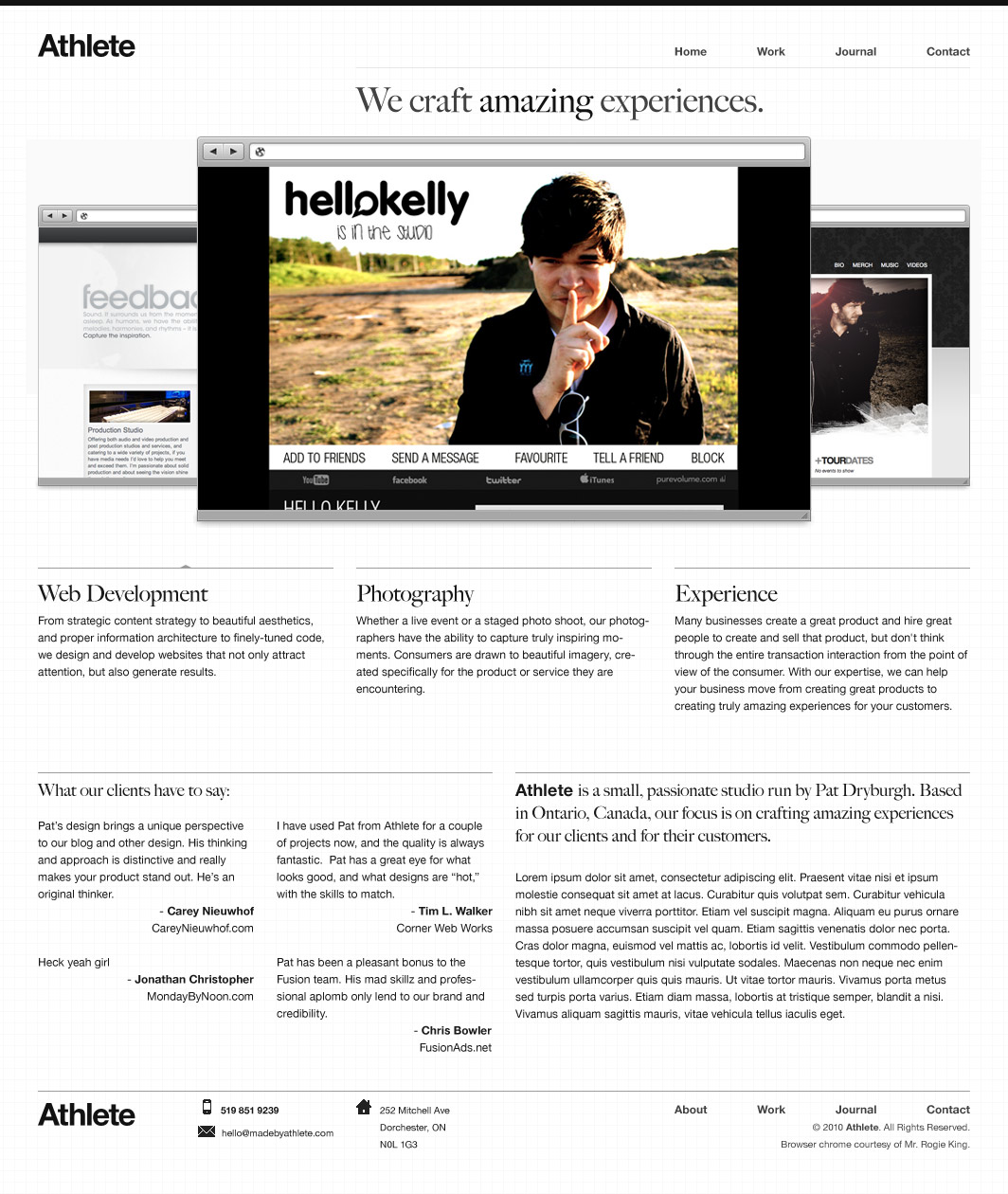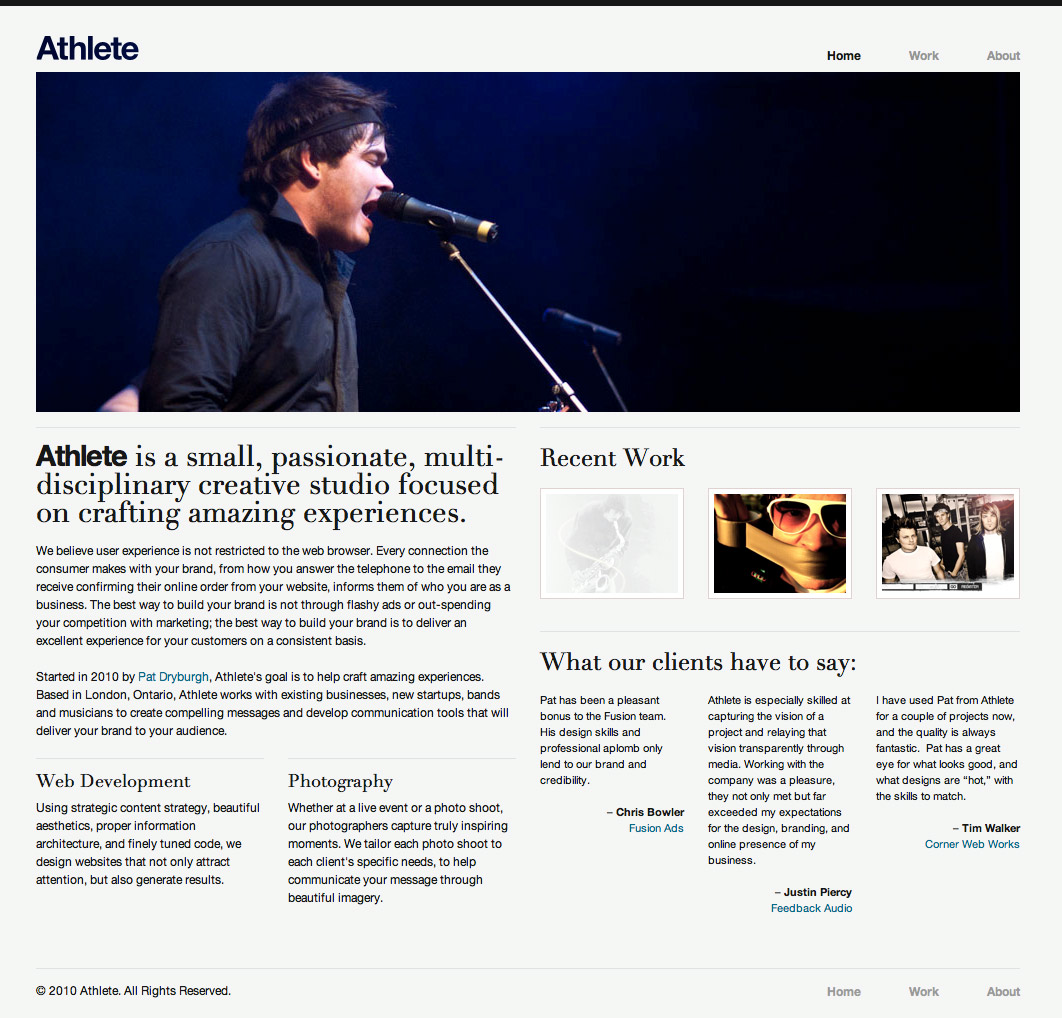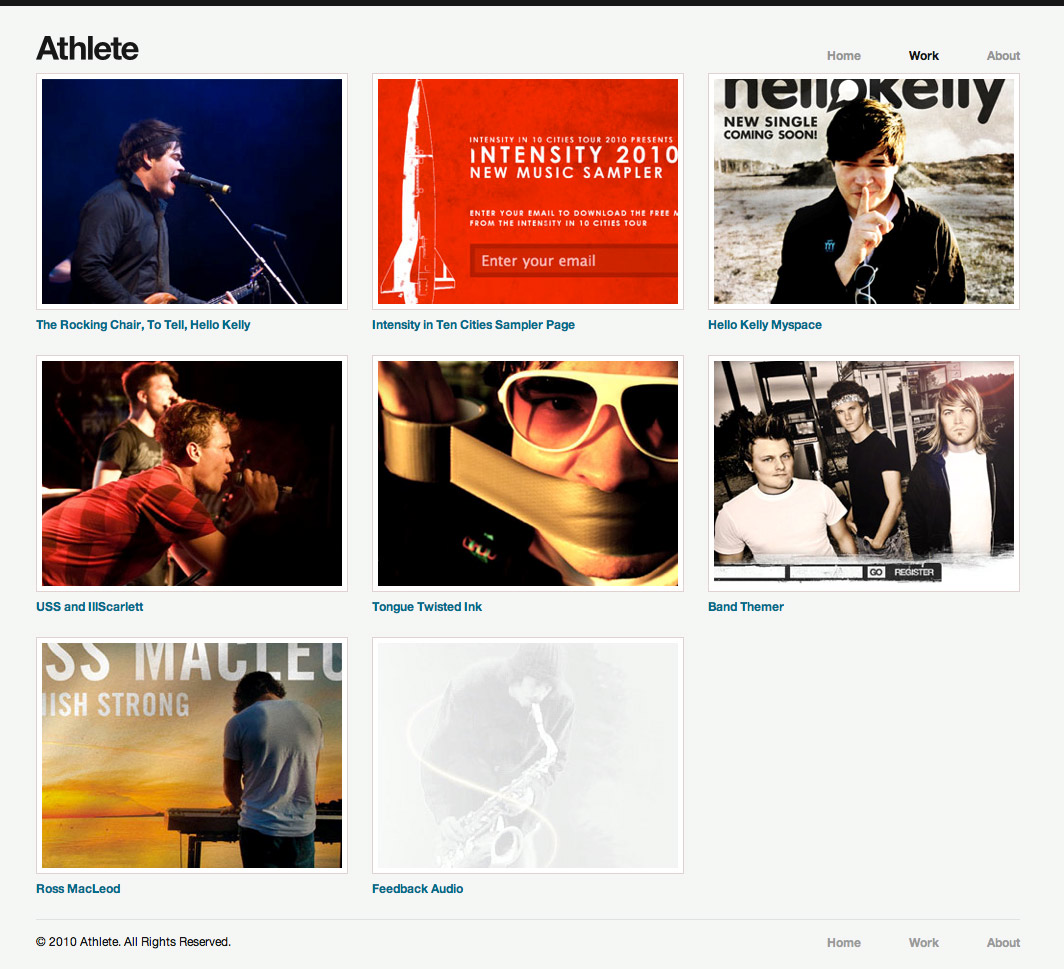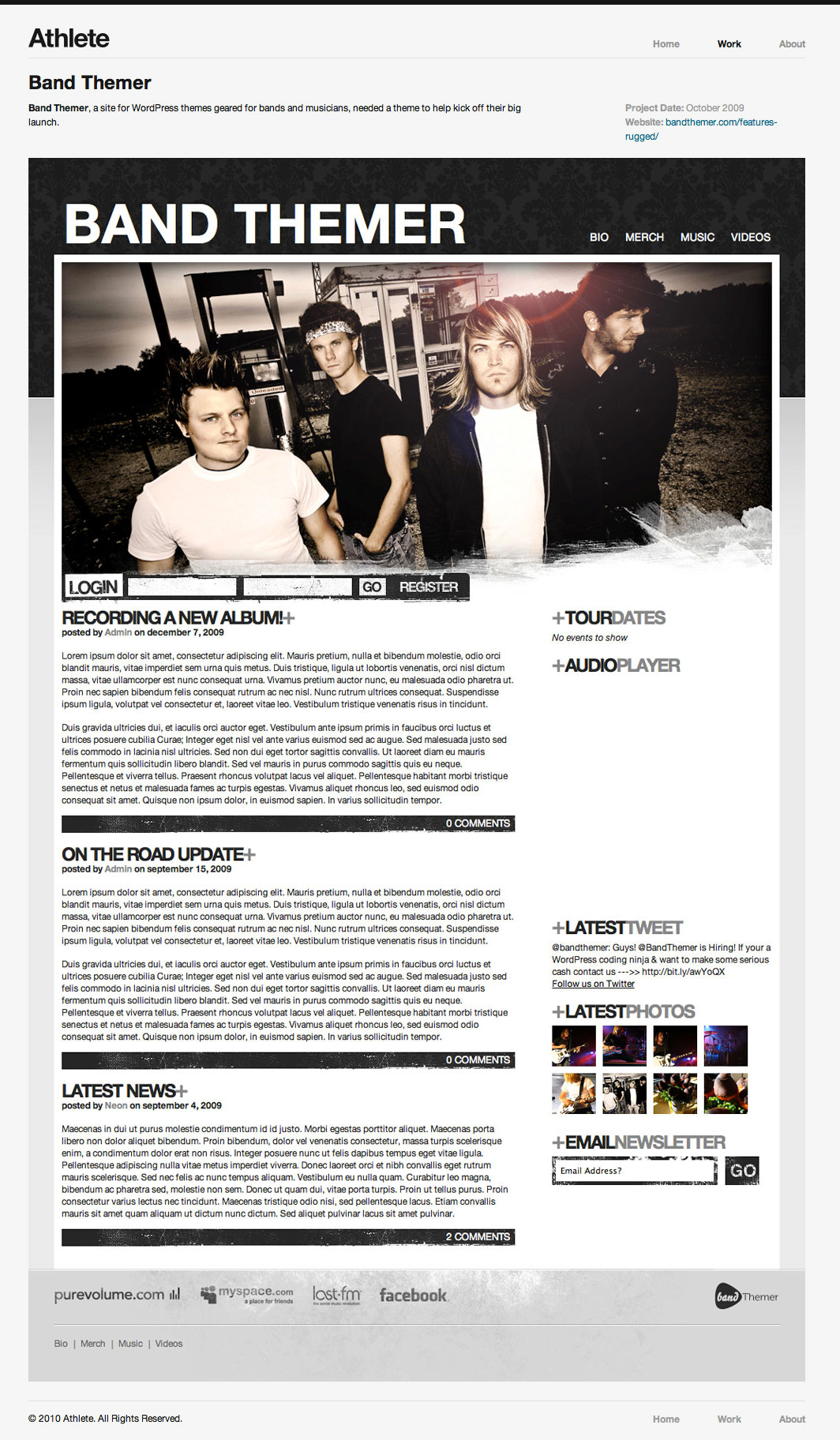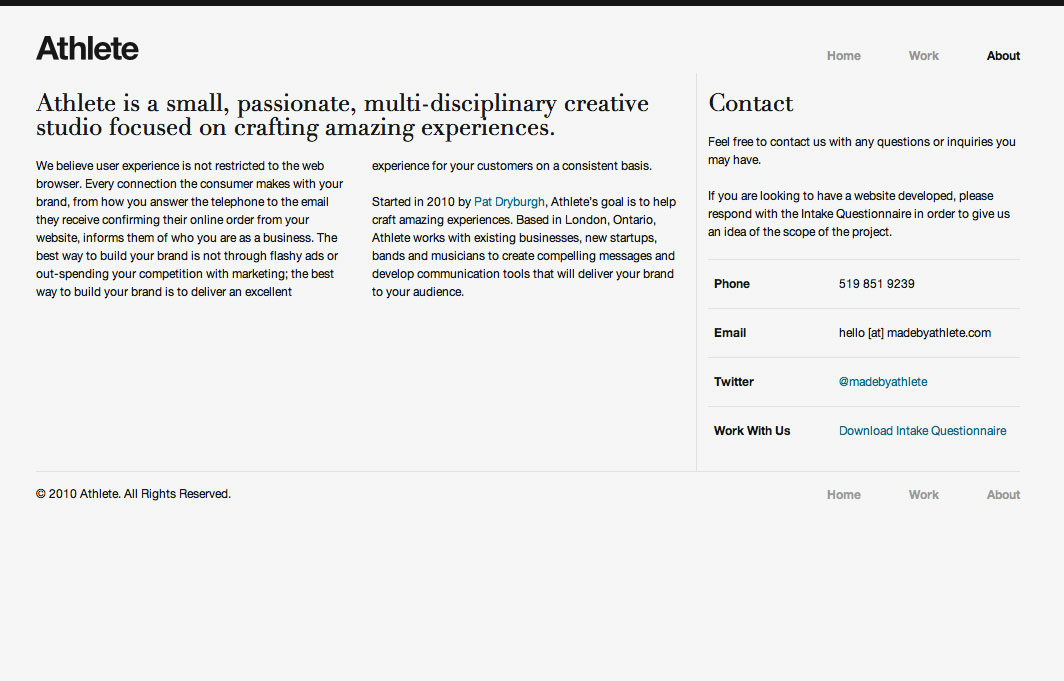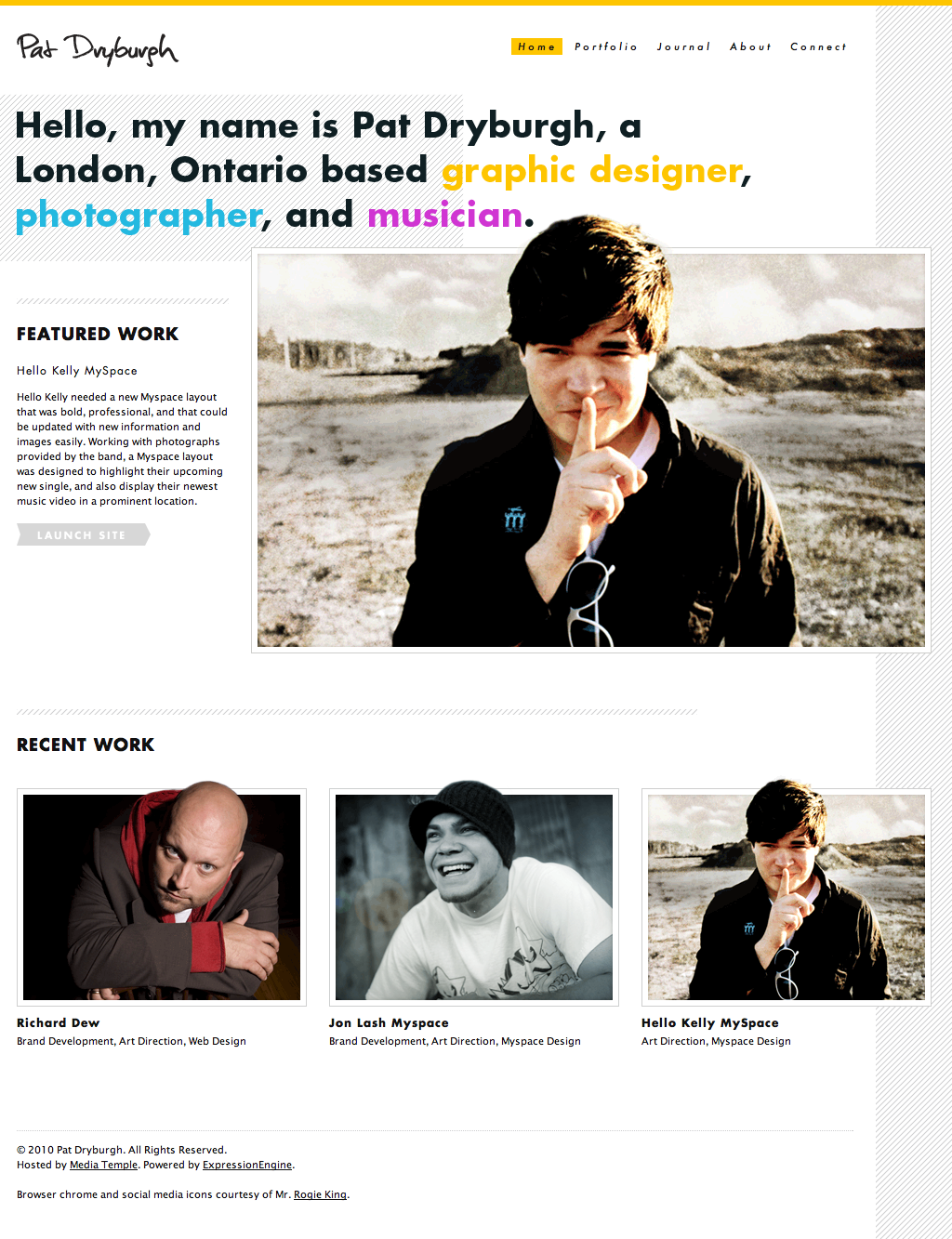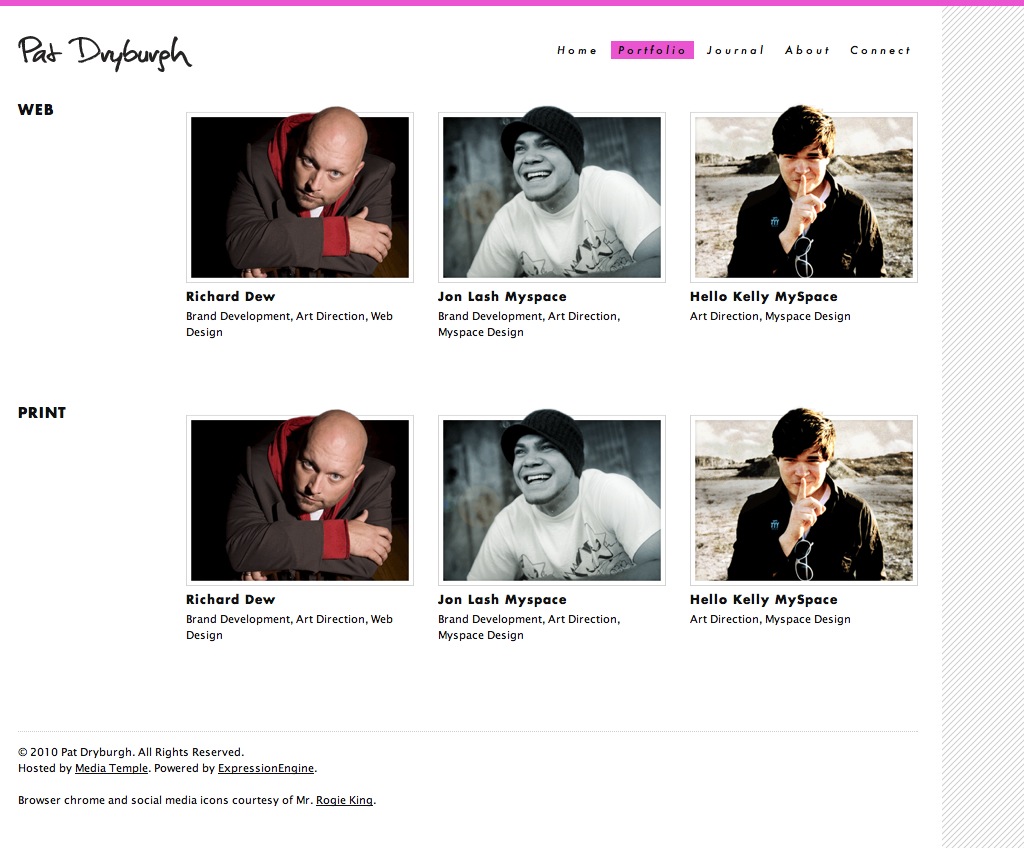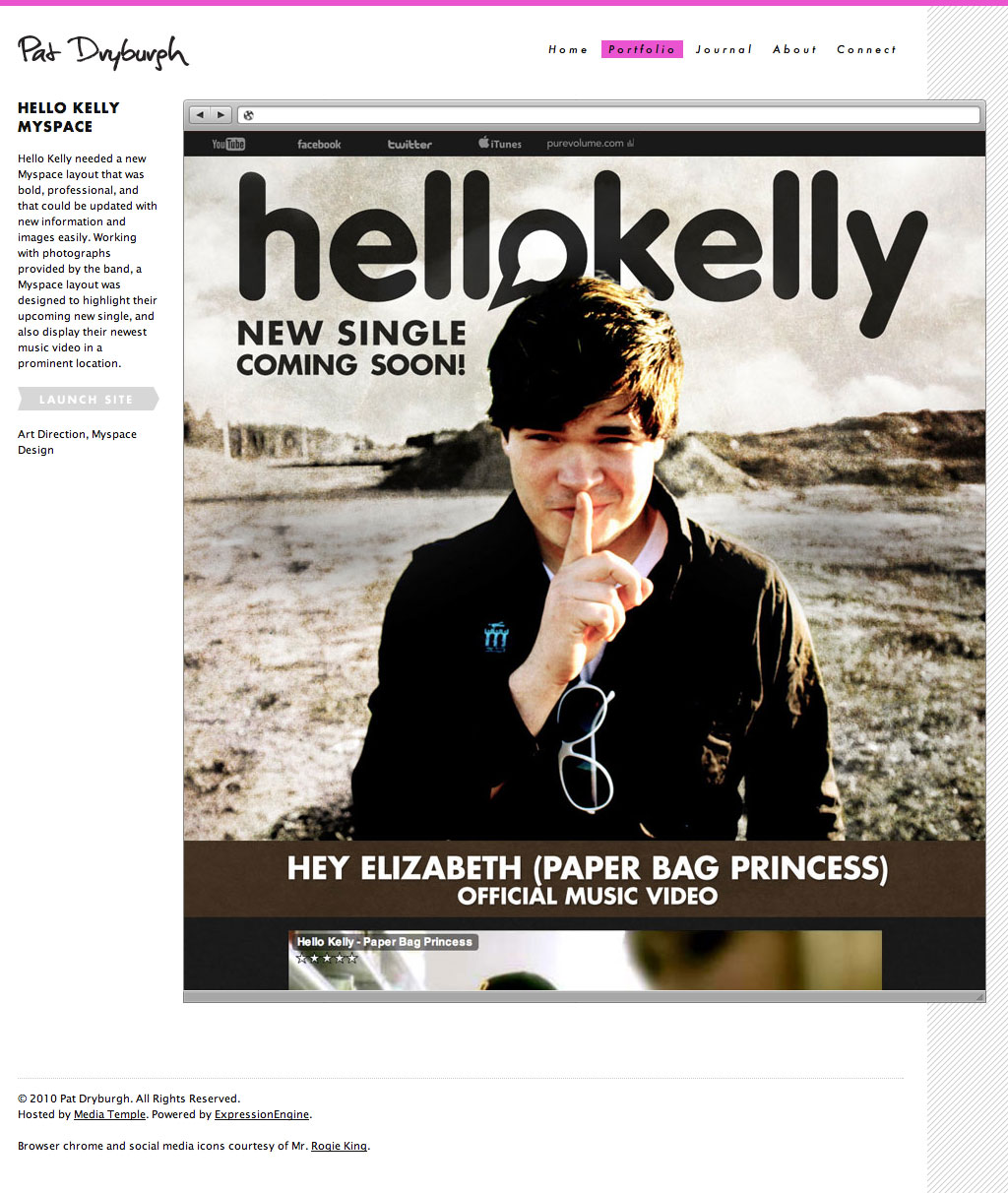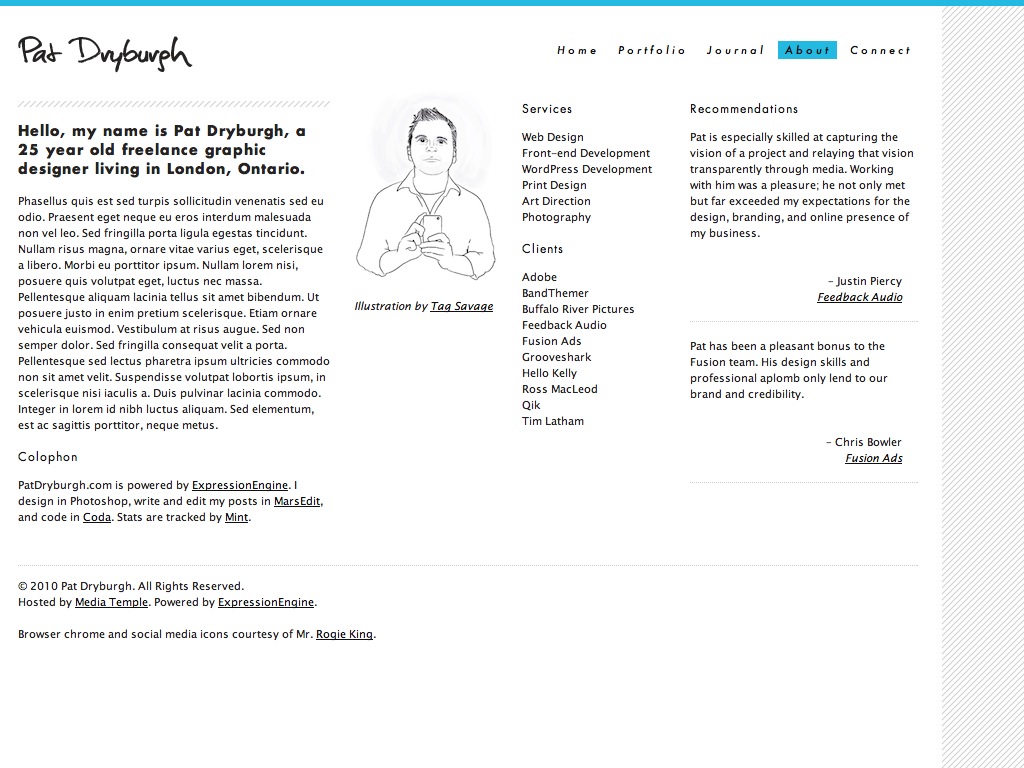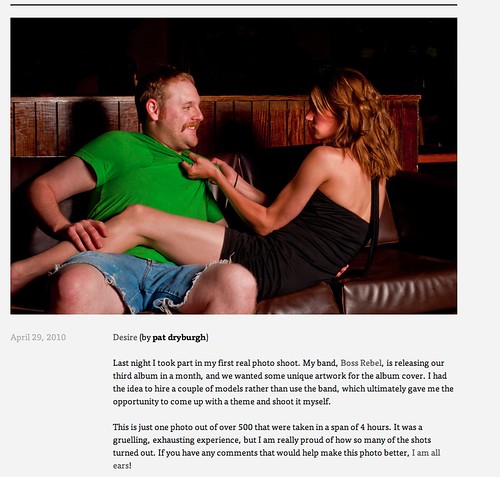This is being posted for archiving purposes. Unfortunately, Ian is having to take down his site for personal reasons. He has agreed to allow me to post the interview he did with me here so it isn’t lost. - Pat
Pat Dryburgh is, in the most simple of terms, a 24-year old creative professional from London, Ontario, Canada (eh?). But, to be honest, that really undersells him. Pat’s a musician, one of the graphic designers behind those phenomenal Fusion Ads we all love so much, an exceptional blogger, and a really swell guy.
On top of all the great stuff he’s already doing, Pat’s also gearing up to launch his own design business.
I had the chance to interview Pat via email for the last few weeks; it was a blast. Here’s the transcript.
The Interview
Ian P. Hines: First of all, thanks for agreeing to be interviewed. I think this is going to be a lot of fun.
Let’s start at the beginning: How long have you kept a weblog, and what made you get started in the first place?
Patrick Dryburgh: Thank you for inviting me to be a part of this!
I started blogging back in 2004, when I was first entering college. Back then, it was a Xanga blog, and a large number of my college mates were a part of the blogging community. I wrote mostly regarding personal situations and feelings, shared songs I was writing and participated in the community our school had created.
A couple years later I started blogging at PatDryburgh.net under the title “Journeys of a Rookie Worship Pastor.” I wrote primarily to share what I was doing with those I had left back home, but also to connect with the community of worship pastors that had really just begun developing on the web. I wrote some controversial pieces that sparked quite a bit of debate in ensuing comments, however the main purpose was just to share what I was learning.
After I left the church my blog’s focus moved to design, a topic I had been learning about on the side for a short while and which I had made the decision to pursue as a career.
For the last couple of years, I’ve kept a fairly open approach to blogging, writing primarily about what interests me, rather than trying to focus on just one topic alone.
Ian: Interesting that you initially got into blogging to participate in an online dialog with people you knew offline. Do you find that that’s still the case–that the people you connect with through your blog are people you know in the offline world–or did a shift occur somewhere along the line?
Pat: There was definitely a shift that happened somewhere along the way.
The platform my “offline friends” and I were using online was so simple to use, and by design facilitated community. We also had the benefit of physically living in close quarters, so our blogs were just a natural extension of conversations we were having in the real world. There were also the normal social aspects to it, such as popularity contests, fighting, backstabbing, etc. But, there was also a lot of good that came from it, like supporting someone when they were down.
When I left college, I moved my blog to a WordPress installation. While it still facilitated community, the community that formed was centred around my blog, rather than around the school I was attending. Like I said earlier, part of the reason for starting my next blog was to enter into a new community, which wasn’t a community I knew personally offline. Because of this, and because I was no longer on a community-centric platform, the shift of my blog changed from friends I knew offline to friends I was making online.
Today, Facebook is how I remain connected to those I know offline. I only allow people I know personally to be a Facebook friend, and use it to plan hang outs, coffee meet ups, concerts, and share stories and photos from each of these. I don’t pipe my blog or Twitter feed into it, because I don’t want to use it to broadcast myself to those who already know me. If they want to follow me on my other online sites, that’s up to them, but I let it be their choice.
I have to be honest, I really have little idea of who specifically is reading my blog. I don’t have a comments section, so if people want to respond to something it has to be through Twitter or email. I do know some people who are reading, yourself included, and I appreciate it so much when they make the effort to reach out and introduce themselves. I’ve made some really great online friends, a few of which I have had the pleasure of meeting in person as well. I think this is an experience that is shared by many in the blogging community, as our world is becoming increasingly smaller each day.
Ian: I can definitely connect with the idea of starting a new blog in order to connect with a new community; I’m glad you mentioned that, because it’s something I want to come back to.
You mentioned that you use Facebook to keep in touch with your “real world” friends, so it’s clear that you’ve given some thought to how to you use different forms of social media for different purposes. I am curious: do you think of yourself as having a ’social media strategy?’
Pat: I wouldn’t say I’ve developed a social media strategy, as much as I simply use different tools for different needs. I really try to minimize the amount of noise I allow into my online life (I only follow 150 people on Twitter, and subscribe to about 100 blogs via RSS). Facebook is one of those places where there there’s a lot of noise, so while I don’t mind it from people I know personally, I wouldn’t want a whole lot of it from people I’m following on Twitter as well.
Twitter, Facebook, and blogging all serve different purposes in my life. Twitter is sort of my brain’s feed; I don’t filter a lot of what goes on there. I just let out what comes to mind, and sometimes it’s great and sometimes it’s not. Blogging is about two things for me: collecting and sharing great stuff, and writing quality content about things I care about. Facebook is about finding out what friends are doing on a Saturday night, and then hearing all about it from Monday to Thursday.
I also want to quickly touch on this: I am hesitant to use terms like “real” or “real world” friends when speaking about friends I know offline. I have had real, heart to heart conversations with some great people that I count as good friends even though I’ve never met them in person. To me, that is just as real as someone I’ve shaken hands with. I grew up in a time when I didn’t even know what the internet was; I believe I was 14 or 15 when I first logged on. Kids who have grown up with the internet and Myspace and Facebook and all of these things their whole lives will look back and wonder what the heck we meant by “real world” friends, or “social media strategies.” They will see these things as no different than the notes we passed back and forth in class or those first phone calls from your girlfriend that you had to take in your parents’ kitchen because you didn’t have a phone in your bedroom.
Ian: Wow. See… I don’t think I could have put that sentiment better than myself. I use Facebook a bit differently than you do (essentially like a giant rolodex), but otherwise the general theme is the same. I’m particularly glad that you made a point that you can have just as strong of friendships with people who you know almost exclusively online; I, too, have made some excellent friends online and I would never consider them second class citizens compared to the people I know locally.
You say that blogging, for you, is about sharing interesting content and writing about things you care about; do you try to stick to any specific topic areas, or do you just keep it open to whatever is on your mind? I’ve been reading your blog for several months and it seems to me like you fall closer to the latter.
Pat: Of any part of my online presence, I have put the most thought into my blog. There has been a lot of discussion over the years as more and more people get into blogging about what people should be writing about. One particular thought is that a blogger should pick a niche and write solely about it. While I see the merit in having a narrow focus in business or as a writer for a particular publication (whether online or in print), for a personal blog I believe there is only one viable topic: you. That isn’t to say you have to write about what you do every day or share your deepest darkest secrets, but rather that who you are should ooze from every pixel on your personal site.
I look at some of the writers I admire most. John Gruber, Chris Bowler, Shawn Blanc; while these writers are well known for their articles on design and technology, they also touch on other aspects of life that they are passionate about. For myself, while I am passionate about design, I am equally passionate about music. I also am interested in business, culture, leadership, and a lot more. So those are the things I am going to write about; some of the writing is to share what I know, some of it is to simply help process random thoughts I have in my head.
Someone who has taken a decidedly different approach that I admire is Patrick Rhone. Rather than have a number of different topics fill up his personal blog, Patrick has chosen to spread his topics out to their own individual domains: Minimal Mac, Practical Opacity, The Random Post.
I think whatever someone’s strategy, it needs to be something they can manage, and something they can be proud of. For a while, I wasn’t proud of my blog because I was trying to cater to pageviews and ad clicks. Now, I choose to write about what I’m passionate about and if someone else likes it, then we would probably be good friends.
Ian: I feel the same way about my own blog; I always tell my wife that my target audience is that guy out there who is exactly like me. If I found my blog, I’d love it, and that’s how I know it’s done right.
Shifting gears a bit, you recently moved from Wordpress to Tumblr–a decision that I gather you did not make lightly. Can you explain a bit about what you look for in a CMS, why you made the move, and whether–now that you have some perspective–you think it was the right choice?
Pat: I was just wondering the same thing the other day :).
Quite frankly, I don’t know whether there is a “right” choice in terms of blogging software. There are so many options out there, all with their own strengths and weaknesses. WordPress, for instance, is insanely powerful; there is almost nothing you can’t create with it. Tumblr is a lot more narrow-focused, with a lot less access for customization. However, what you lose in ability to customize you gain in ease of use; once the design was finalized, it took just a few hours to get it working with Tumblr. The same thing would have taken days with WordPress.
The reason I ended up choosing Tumblr of WordPress for my personal blog was that I didn’t want to have to fuss over all of the technical details. I wanted some of the harder decisions to be made for me, simply because I didn’t have time to work through it all. If I was given a lot more time to work at it, WordPress, Chyrp, Textpattern or Expression Engine were all viable options I had to look at.
One thing I do regret from leaving my WordPress site was the archives I left behind. They are still online, but I do wish the old content was connected to the newer content in some manner.
Ian: I’ve gone through similar debates with myself. Ultimately I decided to move to Tumblr for a lot of the same reasons you did: it’s more simple, straightforward, and it’s so easy to get content into it (MarsEdit, the Bookmarklet, the beautiful Dashboard, etc.). In fact, one of the biggest motivators for making the switch was the fact that you, Chris Bowler, and Jorge Quinteros had decided to use it for your blogs (I’m a big believer in taking the advice of trusted sources).
One frustration I have, however, is that despite Tumblr’s excellent backup feature it’s essentially impossible to export your data in any standardized format. Even if I wanted to move back to a Wordpress or ExpressionEngine install, I would be unable to export my content. I guess, in a nutshell, it’s not that I’m unhappy with Tumblr so much as that I feel trapped. I wonder if that’s not the same feeling that prompted you to wonder about moving back?
Pat: Actually, the reason I started thinking about moving back was while I was perusing Khoi Vinh’s archives. They are so well organized, and presented in such an attractive manner. “The Tumblr default archive page http://patdryburgh.com/archive/ is not very attractive and, unfortunately, not editable.” If I was able to determine how this page looked in order to bring it inline with my site’s design, I wouldn’t even be thinking about leaving Tumblr.
That said, you have made an excellent point about data portability. The Tumblr Backup Utility is amazing; the best blog backup utility I’ve seen. However, it is currently
- only available for Macs, and
- only good for getting HTML output of your posts
So, the case of wanting to move from Tumblr to WordPress does create a concern. There are tools available to help, but nothing official from either Tumblr or Automattic. Until then, where you choose to publish is a serious decision if you have any intention of moving at some point.
Ian: Right. It’s funny that you mention Khoi Vinh’s archives, because my jaw just about hit the floor when I saw Basic Maths, a Wordpress template made by Khoi and Allan Cole. It’s modeled after Khoi’s site, and has just about everything I’m looking for in a template. But is it enough for me to move back to Wordpress? I’m still on the fence.
But back to you… I’m curious if you have a favorite article that you’ve written? It could be anything: short, long, whatever. Just something that you look back and say “I’m really proud of that.”
Pat: I have a few favourite posts. One is “My Greatest Accomplishment Ever,” which was about paying off the last of my $12,000 debt. Not only was I happy with how the writing turned out, but this post got a ton of positive feedback. Dave Ramsey, a popular financial coach and radio show host actually read the post on his radio show! That post has probably received the most positive feedback out of anything I’ve written before or since.
“Ninety-Eight Degrees” was another fun article to write back when I was using WordPress. It was about the newly released Fever app from Shaun Inman. Probably the best review article I’ve ever written.
Last but not least, “Tie Those Laces, Son” was another piece from my WordPress days, about the importance for discipline in life.
Ian: I can actually remember when I read each of those posts (particularly the one about debt), and going back to look at them now I find them even better than I remember. Great choices.
What about other people’s posts. What are a few you’ve read and just thought, “Wow, I wish I could write that well…”?
Pat: There are probably hundreds of articles I’ve read where I’ve thought “Wow, I wish I could write that well.” Heck, there are probably stories written by 3 year olds that greatly surpass my abilities. That said, here are a few off the top of my head:
- “The Myth of Talent” – Michael Mistretta. In spite of how young he is, Michael is ten times wiser than most people my age. His attitude towards business, photography, design and life challenge my thoughts. This article blew away any idea I had that I could just pick up a camera and shoot masterpieces, or that I could open a word processor and beautiful, elegant words would just flow. It takes effort — as Malcolm Gladwell claims, 10,000 hours of effort — to become great at something.
- “Two Things” – Shawn Blanc. This post was huge, and I mean that both figuratively and literally. Seriously, go there and see how small that scroll bar becomes. Then realize that there aren’t comments on that page, just straight-up content from the brilliant mind of Mr. Blanc. I basically pull my wallet out whenever I see a review post from Shawn, not because he sells the product, but because he makes it clear how my life will be better with that product, and he’s always right.
- “Getting Real With Your Lists” – Patrick Rhone. Patrick is one of the most straight up front guys on the net. He calls it as it is, and doesn’t stand down to those who disagree. I read this article a while back and realized I’d been doing my whole GTD thing wrong. I still do it wrong, and need to fix it again, but Patrick’s straight forward “shut up and do it” approach inspires me when I need that extra encouragement.
There are literally dozens more I know I’m missing. My Instapaper archive is full of articles I could include. I think what sets these three writers apart is that they don’t just write; these guys live what they share on their sites, and that inspires me to aspire to the same.
Ian: Alright… now I know why I enjoy following your blog so much: I haven’t read Patrick’s article, but the other two had a really profound affect on me when I read them, as well. You have good taste, sir.
Alright, I think we should probably wrap this up while it’s still at a moderately readable length. Last question: Would you mind sharing a little bit about your music? You’ve shared a little about it on your blog, but it’s generally a bit of a mystery.
Pat: Yeah, that’s mostly because I haven’t had a chance to record, and therefore don’t have much to share!
I currently play in a reggae/ska/rock band called Boss Rebel. They have been a band for a couple years now, and I just joined a few months back. We mostly play the bar scene in the Southwestern Ontario area. We are actually going to the studio in the next month, so I should have something to share soon!
I also write a lot of acoustic stuff on my own. I sometimes record and post them to YouTube, but hope to one day record an EP of songs from that as well. Perhaps by the summer I should have a few songs done that I can post to my blog.
※ Permalink for “Interview with Pat Dryburgh” published on date_to_rfc822

